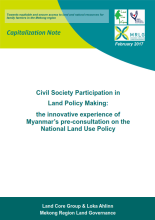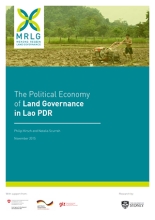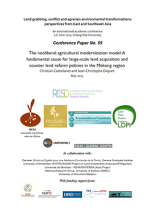Land Library
Bienvenue dans la bibliothèque du Land Portal. Explorez notre vaste collection de ressources en libre accès (plus de 74 000), comprenant des rapports, des articles scientifiques, des articles de recherche, des publications évaluées par des pairs, des documents juridiques, des vidéos et bien plus encore.
/ library resources
Showing items 1 through 9 of 34.In October 2014, for the first time in recent history, the government of Myanmar decided to organize a public consultation to inform the development of a national policy.
“Land matters” – more than ever! Can land be dealt with like other resources or – in terms of an economic perspective– forms of capital. Or does it attract particular meanings, sentiments, interests, acquisition strategies or social relations?
All four countries in continental South-East Asia featured in this paper (Myanmar, Cambodia, Laos and Vietnam) are experiencing land conflicts that could potentially destabilise their governments.1 Thailand is in a similar situation in many respects, as it has faced mounting tensions over land te
This country level analysis addresses land governance in Laos in two ways. First, it summarises what the existing body of knowledge tells us about power and configurations that shape access to and exclusion from land, particularly among smallholders, the rural poor, ethnic minorities and women.
This conference paper examines how the ideology and programmatic set of policies coined in the term ‘neoliberal modernization’ applies to agriculture and practices in the Mekong region.
This Topic Guide covers: the trends in and drivers of large-scale land acquisition, and the associated costs, risks and benefits; the provision of and access to more accurate data on large-scale land acquisitions, and key international and regional initiatives to provide guidelines to enhance sec
Few development challenges in Africa are as pressing and controversial as land ownership and its persistent gap between rich and poor communities.
Almost all societies acknowledge the concept of state or public landownership in which property rights are vested in a public body on a national, regional or community level. State and public land tenure arrangements define rules for the distribution, use and protection of publicly vested lands.
Countries retain powers of compulsory acquisition in order to enable governments to acquire land for specific purposes.





